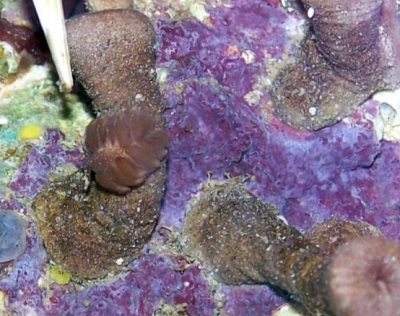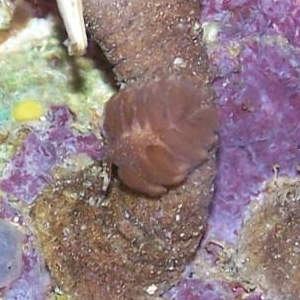Aeolidiopsis sp. in aquarium
March 13, 2007
From: Scott Smith

Here is a picture of what I believe is an aeolid nudibranch that hitch-hiked with some brown button polyps in my home tank. He is dorsal-ventrally flattened, which I have never personally seen in an aeolid (I'm not an expert either). There is a kabob skewer in the picture for size reference. I was told that the polyps were propagated and not wild caught so I unfortunately do not know the original locality. If it helps at all, the nudibranch is feeding on the brown polyps and killing them, but will not touch the blue ones seen in the same picture. The brown polyps used to be perfectly color matched until they started dying, so I assume that the nudibranch feeds primarily on this species. Can you point me in the right direction if nothing else as far as identifying this critter? Thank you for your time.
Locality: Wrightsville beach, North Carolina, 08 March 2007, Reef. Length: 10 mm. Photographer: Scott Smith.
Scott Smith
sas6523@uncw.edu
Smith, S.A., 2007 (Mar 13) Aeolidiopsis sp. in aquarium. [Message in] Sea Slug Forum. Australian Museum, Sydney. Available from http://www.seaslugforum.net/find/19632
Dear Scott,
Have a look at the Palythoa feeding page. Your animal looks quite like the Palythoa -feeding aeolid Aeolidiopsis harrietae, but I can't see enough detail in your photo to be 100% sure. There seem to be a number of related aeolid nudibranchs which seem to travel with these cnidarians as they are sold to aquarium people such as you. Aeolidiopsis is solar-powered, harbouring and utilising zooxanthellae from the cnidarians they are feeding on. The close colour match between the nudibranch and the polyps, is because in both cases the background colour is caused by the symbiotic zooxanthellae. You mention it has a very flattened shape. This is an adaptation to solar power and photosynthesis - like leaves, these animals have become flattened and thin to maximise the amount of sunlight that strikes the surface.
Best wishes,
Bill Rudman
Related messages
-
Re: Polyp-feeding nudibranch
From: erik, April 20, 2007 -
Re: Polyp-feeding nudibranch
From: Jack Kryppy, November 7, 2006 -
Re: Polyp-feeding nudibranch
From: David Sherrer, October 27, 2006 -
Re: Perhaps a gorgonian feeder?
From: Leslie Harris, August 26, 2006 -
Re: Perhaps a gorgonian feeder?
From: Jon Humphreys, August 26, 2006 -
Perhaps a gorgonian feeder?
From: Jon Humphreys, August 25, 2006 -
Polyp-feeding nudibranch
From: Mark Johnson, December 7, 2002 -
Nudibranch or sea slug pest in my aquarium
From: ronman, October 29, 2002 -
Another Palythoa-feeding slug
From: Michael Mrutzek, October 17, 2002 -
Palythoa -feeding nudibranch
From: Michael Mrutzek, October 16, 2002
